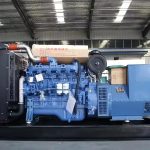Introduction
Agriculture is the backbone of society, providing food, fiber, and other essential resources to support human life. In the modern world, agricultural practices have evolved significantly, with technology playing an increasingly important role in enhancing productivity and efficiency. One crucial component of modern agricultural operations is the diesel generator, which serves as a reliable source of power for a wide range of applications on the farm. In this article, we will explore the essential role of diesel generators in agriculture, highlighting their benefits, applications, and the key considerations for selecting and operating these vital pieces of equipment.
Benefits of Diesel Generators in Agriculture
1. Reliability: One of the primary advantages of diesel generators is their reliability. Unlike other power sources that may be prone to fluctuations or interruptions, diesel generators provide a stable and consistent source of power, ensuring that critical operations on the farm can continue without disruption. This reliability is especially important in agricultural settings where downtime can have significant consequences, such as crop spoilage or livestock health issues.
2. Power Output: Diesel generators are known for their high power output, making them suitable for a wide range of applications in agriculture. Whether it's running irrigation systems, powering machinery, or providing backup power during outages, diesel generators have the capacity to meet the demanding power requirements of modern farms.
3. Fuel Efficiency: Diesel generators are more fuel-efficient compared to other types of generators, such as gasoline or propane models. This fuel efficiency not only helps reduce operating costs but also makes diesel generators a more environmentally friendly option for powering agricultural operations.
4. Durability: Diesel generators are built to withstand the rigors of agricultural work environments, including exposure to dust, dirt, and extreme weather conditions. Their robust construction and high-quality components ensure long-term reliability and performance, even in the harshest conditions.
Applications of Diesel Generators in Agriculture
1. Irrigation Systems: One of the primary applications of diesel generators in agriculture is powering irrigation systems. Irrigation is essential for maintaining crop health and productivity, especially in regions with limited water availability. Diesel generators can provide the necessary power to run pumps, sprinklers, and other irrigation equipment, ensuring that crops receive the water they need to thrive.
2. Machinery Power: Diesel generators are also used to power a variety of farm machinery, including tractors, combines, and other equipment. These machines require significant power to operate efficiently, and diesel generators are well-suited to provide the high levels of power needed for these applications.
3. Livestock Operations: In livestock farming, diesel generators are used to power barns, feeding systems, and other equipment essential for animal care. Reliable power is critical in maintaining optimal conditions for livestock health and welfare, making diesel generators an indispensable tool for modern livestock operations.
4. Backup Power: Diesel generators serve as an essential source of backup power on farms, ensuring that critical operations can continue even during power outages. Whether it's preserving perishable crops in cold storage or maintaining ventilation systems in livestock barns, diesel generators provide a reliable source of backup power to safeguard farm operations.
Considerations for Selecting and Operating Diesel Generators in Agriculture
1. Power Requirements: When selecting a diesel generator for agricultural use, it's essential to consider the power requirements of the specific applications you intend to power. Calculate the total power load of all the equipment you plan to run simultaneously to determine the appropriate generator size needed to meet your needs.
2. Fuel Efficiency: Look for diesel generators that offer high fuel efficiency to minimize operating costs and reduce environmental impact. 400kw generator are equipped with advanced technologies that optimize fuel consumption, ensuring efficient operation over extended periods.
3. Maintenance: Regular maintenance is crucial to ensure the reliable performance of diesel generators on the farm. Schedule routine inspections, oil changes, and filter replacements to keep your generator in top condition and prevent unexpected breakdowns that can disrupt farm operations.

4. Environmental Impact: While diesel generators are known for their efficiency and reliability, it's essential to consider their environmental impact. Choose generators that comply with emission regulations and opt for models with advanced emission control systems to minimize pollution and reduce your farm's carbon footprint.
Conclusion
Diesel generators play a vital role in powering modern agricultural operations, providing a reliable and efficient source of power for a wide range of applications on the farm. From running irrigation systems and machinery to supporting livestock operations and providing backup power during outages, diesel generators are indispensable tools that enhance productivity and ensure the smooth functioning of farm activities. By considering key factors such as power requirements, fuel efficiency, maintenance, and environmental impact, farmers can select and operate diesel generators effectively to support their agricultural endeavors and drive growth and sustainability in the industry.
